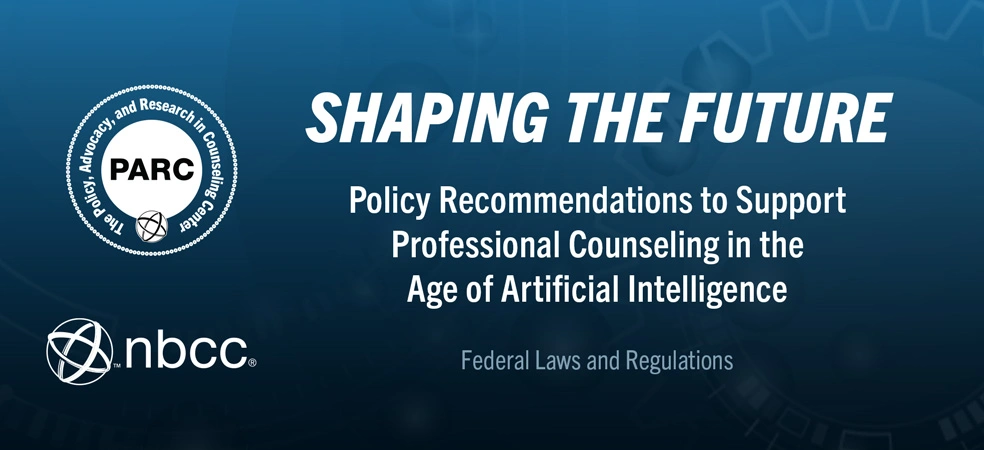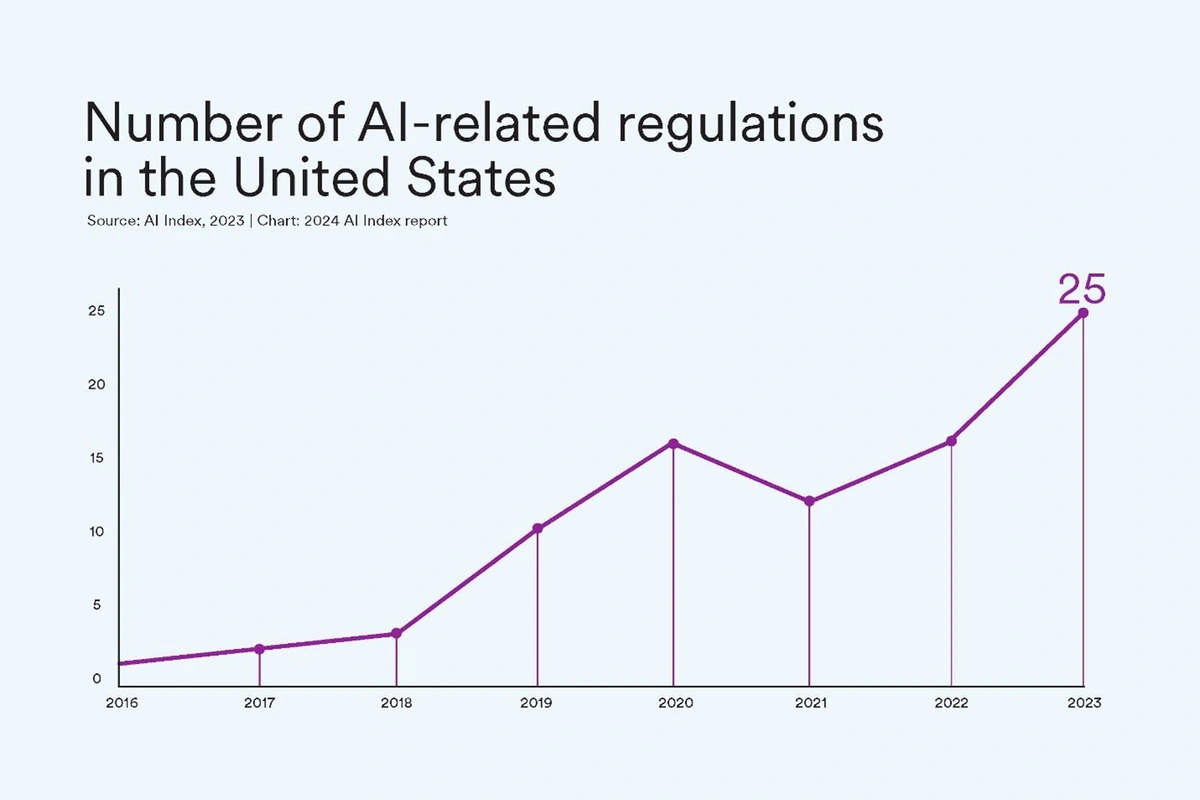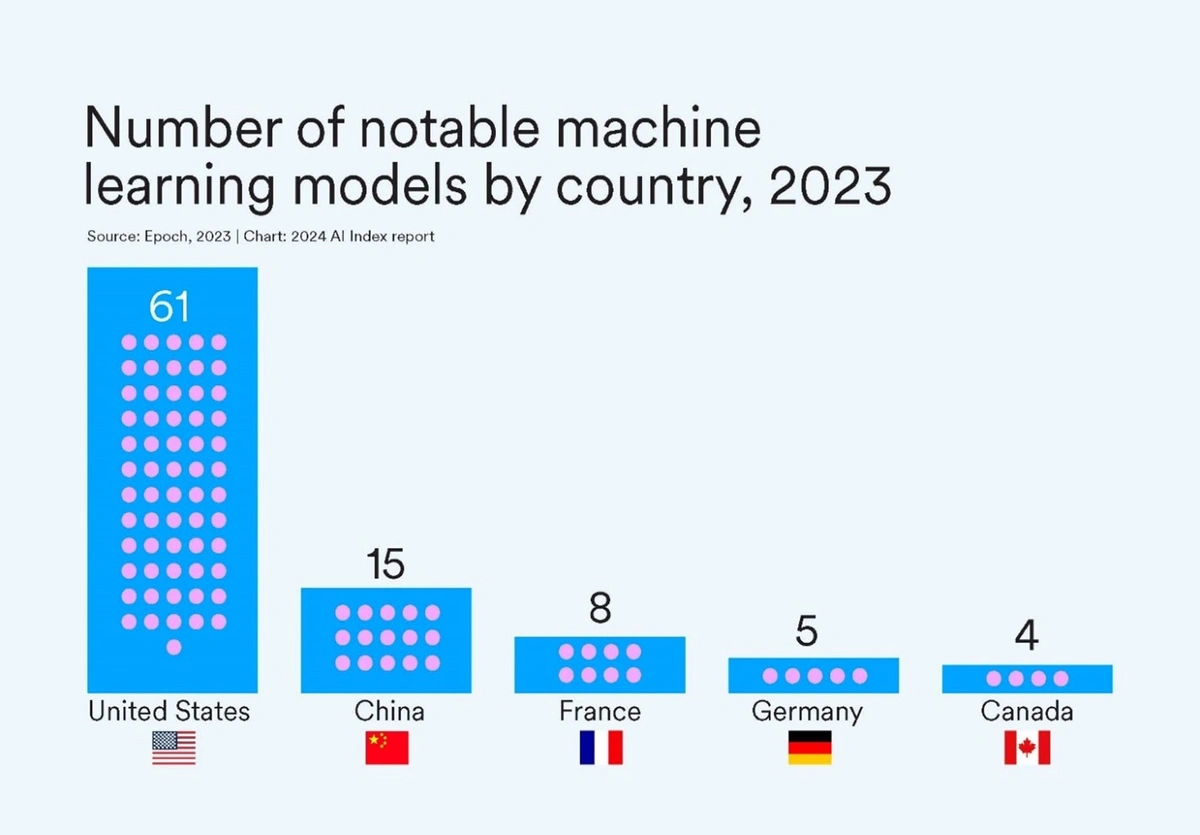Article Published: 5/21/2025

This document explores artificial intelligence (AI) policies and regulations, with the aim to identify improvements that the Policy, Advocacy, and Research in Counseling Center (PARC) will further research in order to enhance regulatory support for the counseling profession.
Introduction: This document explores the integration of artificial intelligence (AI) into professional counseling and provides policy recommendations to enhance regulatory support for the counseling profession.
Defining Artificial Intelligence: AI refers to the capability of digital computers or robots to perform tasks typically associated with human intelligence, such as reasoning, learning, and problem-solving.
AI and Mental Health Care: AI has evolved significantly since the 1950s and is now playing a transformative role in health care, including mental health services. With a growing demand for mental health services and a projected shortage of mental health professionals, AI’s potential to increase access and efficiency in the counseling profession is critical.
Ethical Principles: The National Board for Certified Counselors (NBCC) has released Ethical Principles for Artificial Intelligence in Counseling, emphasizing accountability, client welfare, competence, and confidentiality.
Federal Laws and Regulations: As of 2023, the United States had 25 AI-related regulations focusing on cybersecurity, copyrights, and program governance. The White House and Congress continue to actively develop policies specific to AI’s safe, secure, and ethical use.
Key Federal AI Focus Areas: Safe and Effective Systems, Algorithmic Discriminations Protection, Data Privacy, Notice and Explanations, Human Alternatives Fall Back.
White House Initiatives: Recent executive orders and initiatives aim to ensure that the United States remains a global leader in the development of AI technologies. Key actions include investing in AI research and establishing a national AI research institute.
Congressional AI Task Force and Caucuses: Key groups that have focused on AI are the U.S. House Bipartisan Task Force on AI, the Congressional AI Caucus, and the Senate AI Caucus.
Policy Recommendations:
Conclusion: AI has the potential to enhance mental health services by streamlining administrative tasks and improving client care. The counseling profession must engage with policymakers to ensure AI regulations prioritize ethical standards and client safety.
Artificial intelligence (AI) is the ability of a digital computer or computer-controlled robot to perform tasks commonly associated with intelligent beings (humans). The term is frequently applied to the project of developing systems with the ability to reason, discover meaning, and generalize or learn from past experiences.
Artificial intelligence (AI) has rapidly evolved from a theoretical concept to a transformative force across various sectors, including the health care industry. Originating in the mid-20th century, AI’s roots can be traced back to the 1950s when pioneers like Alan Turing and John McCarthy began exploring the potential of machines to simulate human intelligence. Since then, AI has undergone significant advancements, transitioning from rudimentary algorithms to sophisticated neural networks capable of processing vast amounts of data and learning from patterns.
Today, AI technologies, such as natural language processing and machine learning, are increasingly integrated into everyday applications, influencing how professionals approach their work. As the demand for mental health services grows, the implications of AI are profound for professional counselors.
The National Institute of Mental Health (NIMH) reports that one in five adults in the United States experiences mental illness each year. The Substance Abuse and Mental Health Services Administration (SAMHSA) estimates that by 2025, the United States will experience a shortage of 26,930 mental health counselors, as well as a shortage of 15,400 psychiatrists, and 10,470 marriage and family therapists. Currently, more than 150 million people live in federally designated mental health professional shortage areas.
There is no doubt that in our nation we are facing an unprecedented mental health crisis, and the need to increase access to care is a critical need for the nation. The question yet to be answered is, does AI increase the access and the efficiency of not just mental health services, but also services in career counseling, school counseling, and all other counseling specialties? Understanding the evolution and potential of AI is essential for professional counselors. The health care landscape is rapidly changing; therefore, having a keen understanding of AI will only increase professional relevance and allow counselors to make informed decisions on how they choose to utilize AI within their practices.
The counseling profession has the unique opportunity to advise policy and regulatory experts on the critical need to address the regulatory challenges that will ensure safe and ethical practices.
NBCC recognizes that AI will provide opportunities for professional counselors and present ethical challenges for the profession. It is vital that AI integrations in counseling uphold the core principles of counseling ethics and client well-being. On April 12, 2024, the National Board for Certified Counselors (NBCC) released Ethical Principles for Artificial Intelligence in Counseling, with a focus on accountability, client welfare, competence (AI), competence (clinical), and confidentiality. Each clinical tenet within the principles corresponds to directives from the NBCC Code of Ethics.
As of 2023, the United States had developed 25 regulations to govern AI. These regulations varied in nature and primarily focused on cybersecurity, copyrights, and other program governance. The U.S. Securities and Exchange Commission (SEC) adopted a regulation on July 26, 2023, focused on incident disclosure by public companies. Though the SEC regulations are not directly applicable to the counseling profession, it should be noted that the NBCC and ACA codes of ethics have a focus on Incident Disclosure; therefore, this regulation may have the potential to shape AI regulations for other professions, such as counseling.
Federal Government AI Focus Areas
U.S. Congress AI Task Force and Caucuses
In the U.S. Congress, there has been one task force and two caucuses focused on AI.
Executive Orders, Legislation, and Memorandums: 2019–2023
Between 2019 and 2023, the first Trump administration and the Biden administration, along with the U. S. Department of Health and Human Services (HHS), issued the following executive orders, regulations, and memorandums to drive the HHS AI regulatory agenda:
 |
From AI Index: State of AI in 13 Charts, by S. Lynch, 2024, Stanford Institute for Human-Centered Artificial Intelligence. Copyright 2024 by Stanford University.
During the Biden administration, members of Congress began the process of developing regulations and laws to govern how AI is developed and used throughout the country in and out of government sectors.
The administration issued an executive order with a focus on AI on Oct. 30, 2023. The Executive Order on the Safe, Secure, and Trustworthy Development and Use of Artificial Intelligence aimed to ensure that America leads the way in managing the risks of AI. As stated by the White House, “The Executive Order establishes new standards for AI safety and security, protects Americans’ privacy, advances equity and civil rights, stands up for consumers and workers, promotes innovation and competition, advances American leadership around the world, and more.” (This executive order was revoked by Executive Order 14148 on Jan. 20, 2025.)
President Biden’s executive order was designed to take the following actions:
Note: Bullets in bold impact the counseling profession.
Executive Orders, Legislation, and Memorandums: 2025
Currently, the Trump administration continues to consider the impacts of AI. As of April 23, 2025, the following administrative actions have focused on AI. Please note that these are actions from the White House, and some do not directly impact the counseling profession.
As noted above, the actions described are current initiatives undertaken by the Trump administration. However, these actions do not explicitly demonstrate a positive impact or provide the support needed for regulations vital to the professional counseling community.
The Trump administration has touted the following as the White House AI achievements in 2025:
It is too early to tell if the current administration’s actions will have a positive impact on the nation. It does however appear that AI development and regulations are focused on a variety of industries, with the exception of mental health–related professions, including counseling, psychology, and social work.
As the executive branch, federal agencies, and the U.S. Congress address the rapid development of AI and implications for the United States and the world, it is crucial for counseling advocates to engage with these efforts now to ensure that AI policies and regulations prioritize ethical standards and client safety and act in an inclusive manner to include the human element within technology. Counselors must actively participate in discussions with the nation’s leaders to shape the framework that supports responsible and effective AI use in counseling practice.
For this reason, PARC is assembling a dedicated team focused on the issues that matter most to National Certified Counselors. This team will utilize data collected by counselors to empower decision makers with the information necessary to protect, support, and advance the interests of your profession and the clients served by counselors.
The counseling profession is uniquely positioned to provide recommendations to state and federal officials on utilizing policy to protect both the counseling profession and the clients served by counselors.
There are currently three recommendations that will inform legislators and agency officials of the importance of including mental health care in the health care conversations around AI. Traditionally, the conversations have neglected mental health care providers and primarily focused on physicians.
Recommendations
AI has already made an impact on our daily lives and health care. Data has demonstrated that AI can improve client care by streamlining administrative tasks that clinicians perform daily. The counseling profession has the expertise to be the catalyst to effectively examine the needs of the profession and provide decision-makers with the research and insight they require. It is the responsibility of the counseling profession and stakeholders to understand the need for improved regulations and laws and to share the importance of protecting clients of mental health professionals and the clinicians who support the mental health needs of their clients.
The National Board for Certified Counselors, through the Policy, Advocacy, and Research in Counseling Center (PARC), will look further into developing research and guidance on the best policies legislators must consider that will support the counseling profession and the clients whom counselors help.
Algorithm: command a computer follows in a specific order to perform calculations and solve problems
Anonymization: the process of removing identifiable information from a dataset so that AI models cannot identify individuals
Encryption: the process of scrambling data using mathematical models to make information unreadable to unauthorized parties
Machine Learning: a subfield of artificial intelligence that uses data and algorithms to enable artificial intelligence to learn from experience and improve its accuracy over time (see chart below)
Natural Language (Processing): enables computers to understand and communicate with human language
Neural Networks: a machine learning model that processes data to mimic the human brain
Rudimentary Algorithms: provide a way to model and control a system that displays different behaviors and states based on inputs or events (e.g., a traffic light knows when to turn green, yellow, or red based on the program it is provided.)
 |
From AI Index: State of AI in 13 Charts, by S. Lynch, 2024, Stanford Institute for Human-Centered Artificial Intelligence. Copyright 2024 by Stanford University.
The information provided by the National Board for Certified Counselors, Inc. (NBCC) on the nbcc.org website (site) is for general information purposes only. NBCC makes significant efforts to maintain current and accurate information on this site. We are not responsible for any information concerning NBCC or our programs, services, or activities that is published or displayed on any third-party website(s). These websites are maintained by third parties over which we exercise no control, and for which we have no responsibility. Individuals should verify any information obtained from third-party sources by referring to our official site or contacting our customer service team directly.
Copyright ©2025 National Board for Certified Counselors, Inc. and Affiliates | All rights reserved.